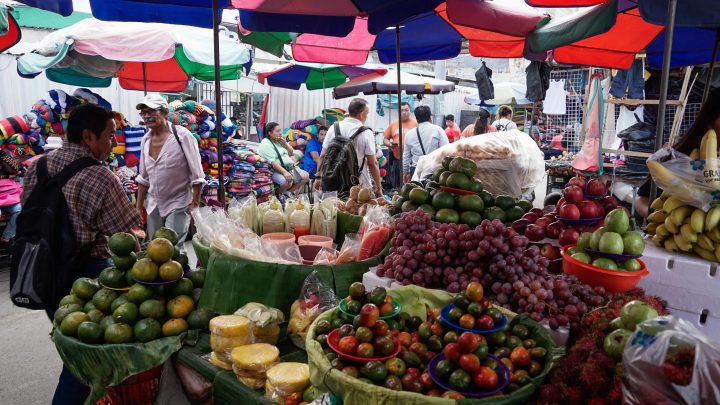
While El Salvador is turning around its reputation for crime, its economy still struggles
While El Salvador is turning around its reputation for crime, its economy still struggles

This story was produced by our colleagues at the BBC.
El Salvador used to be known as one the most dangerous place in the world because of high homicide rates and gang violence.
President Nayib Bukele introduced a state of emergency two years ago; the country is now safer but is still heavily in debt and struggling to grow its economy.
Genira Lopez sells fruit on a street near the historic main square in the capital, San Salvador, and said it’s hard to make a living.
“The security guards confiscate our produce, and we must pay a fine to get it back. The president has cleaned up the center of the city where we are and is getting rid of us street sellers, but this is our only way of making a living and there are a lot of poor people here,” she explained.
Karen Fuentes is a realtor in Re/Max Center El Salvador. She works in a heavily air-conditioned office on the 21st floor of a fancy building in the center of San Salvador, with views of the mountains and volcanos that surround the city as well as some of the neighborhoods where clients clients are looking to buy homes. It’s not just locals who want a piece of the action.
“Our clients are mostly Salvadorans who live here, but 50% are Salvadorans who live outside our country, or even foreigners who don’t have roots here. And right now, because of the perception of our country from outside, they are very interested in El Salvador,” she said.
That popularity means property prices are very high right now.
More tourists are also visiting the country now, taking selfies at the National Library Bukele has built and filling the popular surf beaches. Small scale business owners are happy that gangs no longer ask them for money.
But nearly a third of people live in poverty, according to the World Bank, and many feel they don’t have any choice but to leave the country — like 24-year-old mechanic Jaime Chavez.
“There used to be an problem with security with all the gangs. Now that’s better, but I can’t earn enough to support my family. I get paid around $250 a month, but you need around $450 to $500 to be able to live better,” he said.
Chavez said he wants to leave and go to the U.S. as “most people who have gone there have a better quality of life because there are more opportunities.”
He’s not alone in wanting to leave El Salvador. It’s estimated there are around 1 million Salvadorans living in the United States, according to the Pew Research Center. The money they send home — earned, in part, thanks to successful participation in labor organizing — is crucial, as economist Tatiana Marroquin explained.
“Around 25% of the country’s GDP comes from the money that Salvadorans who have migrated send back to their families,” she said. “We know that for around half of the families who receive the money, it’s their primary source of income or their only source of income.”
Now that El Salvador’s President Bukele has managed to improve security, he says his next job is to tackle poverty. He recently announced 5,000 “free passports” and tax breaks to highly skilled workers from abroad to try to boost the economy.
But people like mechanic Jaime Chavez say they need more opportunities to persuade them not to leave for the U.S.
There’s a lot happening in the world. Through it all, Marketplace is here for you.
You rely on Marketplace to break down the world’s events and tell you how it affects you in a fact-based, approachable way. We rely on your financial support to keep making that possible.
Your donation today powers the independent journalism that you rely on. For just $5/month, you can help sustain Marketplace so we can keep reporting on the things that matter to you.











